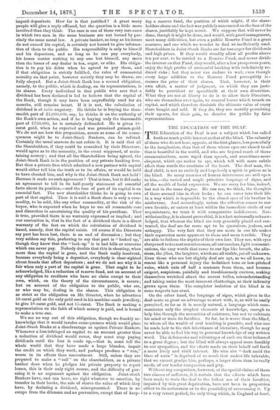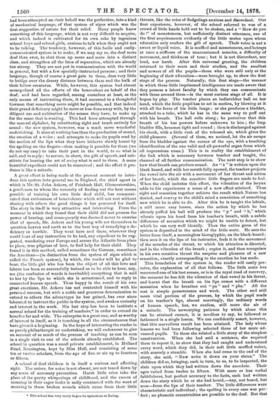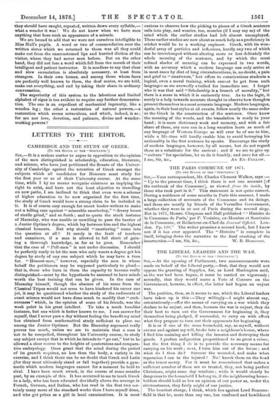THE EDUCATION OF THE DEAF.
MIIE Education of the Deaf is not a subject which has called forth so much public interest as that of the blind. The calamity of those who do not hear, appeals, at the first glance, less powerfully to the imagination, than that of those whose eyes are closed to all that is beautiful in the world, and who are beyond reach of those communications, more rapid than speech, and sometimes more eloquent, which eye makes to eye, which tell with more subtle effect than words the emotions of the heart. The deaf man, the deaf child, is not so entirely and hopelessly a spirit in prison as is the blind. So many avenues of human intercourse arc still open to him,—the varied and ample primitive language of signs, and all the wealth of facial expression. We are sorry for him, indeed, but not in the same degree. Ile can see, we think, the thoughts of those around him in their looks ; he can enter into their life in a way which is impossible to the cloaca eyes of his brother in misfortune. And accordingly, unless the affliction comes to our own fireside, or enters at least within the immediate circle of our acquaintance, we treat it with comparative indifference. Not- withstanding, it is almost proverbial, it is a fact universally acknow- ledged, that whereas the blind are very generally placid and con- tented, the deaf are far more apt to be querulous, jealous, and unhappy. The very fact that they are more in our life makes their separation more apparent to them and more terrible. They are able to fathom the depths of their own loss. They see, with eyes sharpened to keenest consciousness, all our careless, light communi- cations, the easy words that come to our lips like breath, the allu- sions, the jibes, the laughter, which are all visible, yet all unknown. Even those who are but slightly deaf are apt, as we all know, to resent like a personal injury the indistinct tone or low-pitched voice, which cuts off half a sentence from them, and become exigent, suspicions, painfully and troublesomely curious, making themselves wretched about the merest trifles, misunderstanding and taking amiss the most innocent chatterings, as their infirmity grows upon them. The completer isolation of the blind is in some respects less cruel.
On the other hand, the language of signs, which gives to the deaf-mute so great an advantage to start with, is, as will be easily perceived, so far as it is merely natural, a language which com- municates only the simplest elements of knowledge, enough to help him through the necessities of existence, but not to cultivate his mind or train its faculties. So far, he is worse than the blind, to whom all the wealth of oral teaching is possible, and who an be made heir to the rich inheritance of literature, though he may never be able to feel his way to personal knowledge of any written word. The deficiencies and advantages of each are thus balanced to a great degree ; but the blind will always appeal more forcibly to our sympathies, and the efforts made on their behalf call forth a more lively and vivid interest. Ile who sits "dark amid the blaze of noon" is deprived of so much that makes life tolerable, that we cannot grudge him, perhaps, a larger share than he really needs, of our tender compassion and pity.
Without any comparison, however, of the special claims of these two classes of sufferers, it is certain that the efforts which have been made to train the deaf to the fullest use of their faculties, impaired by this great deprivation, have not been in proportion either to its seriousness or to the possibility of overcoming it. Up to a very recent period, the only thing which, in England at least,
had been attempted on their behalf was the perfection, into a kind of mechanical language, of that system of signs which was the first suggestion of nature for their relief. Many people know something of this language, which is not very difficult to acquire, and which indeed is cultivated for its own sake by ingenious school-boys and school-girls, anxious to talk when they ought not to be talking. The tendency, however, of this facile and easily- communicated system is to make, if we may say so, the deaf more deaf than ever, to shut them up more and more into a distinct class, and strengthen all the lines of separation, which are already too strong. They are not put in communication with the world in general, but with a few specially-instructed persons ; and their language, though of course a great gain to them, does very little to bridge over the dreary distance between them and the bulk of their fellow-creatures. While, however, this system had almost monopolised all the efforts of the benevolent on behalf of the deaf, and had been regarded, among ourselves at least, as the only means of instructing them, it had occurred to a thoughtful German that something more might be possible, and that indeed their grand deficiency might be more or less done away with, by the diligent use and cultivation of the senses they have, to make up for the sense that is wanting. This had been attempted through the manual alphabet, by substituting sight and touch entirely for sound ; the new system, however, was a much more wonderful undertaking. It aims at nothing less than the production of sound, the creation of a voice ; and attempts to make its pupils read by the motion of the lips what they have hitherto slowly learnt by the spelling on the fingers—thus making it possible for them (we do not say easy) to take their part in the world, to see what is said, and to reply ; to secure, in short, the gift of speech, and sub- stitute for hearing the art of seeing what is said to them. A more beautiful expedient could not be conceived ; and the effect it pro. duces is like a miracle.
A great effort is being made at the present moment to intro- duce this system into general use in England, the chief agent in which is Mr. St. John Ackers, of Prinkash Hall, Gloucestershire, a gentleman to whom the necessity of finding out the best means possible of training his own little deaf child, has communi- cated that enthusiasm of benevolence which will not rest without sharing with others the good things it has procured for itself. The story in itself is very attractive and interesting. From the moment in which they found that their child did not possess the power of hearing, and consequently was doomed never to exercise that of speech, Mr. Ackers and his young wife set themselves to question heaven and earth as to the best way of remedying a de- ficiency so terrible. They went here and there, wherever they could hear of any instruction to be had, any expedient to be sug- gested, wandering over Europe and across the Atlantic from place to place, true pilgrims of love, to find help for their child. They found it in this method, called sometimes the German, sometimes the American—(in distinction from the system of signs which is called the French system), by which, the reader will be glad to hear, the little girl who has been the object of all this love and labour has been so successfully trained as to be able to bear, nay, see (the confusion of words is inevitable) everything that is said to her by the lips to which she is accustomed, and to reply in connected human speech. Thus happy in the result of his own great exertions, Mr. Ackers has not contented himself with his personal success, but with a noble and generous determination to extend to others the advantages he has gained, has ever since laboured to instruct the public in the system, and awaken curiosity and interest in the work. His last step has been to institute a normal school for the training of teachers,* in order to extend its benefits far and wide. The enterprise is a great one, and as worthy of interest in itself, as it is touching in all the circumstances that have given it a beginning. In the hope of interesting the reader in so purely philanthropic an undertaking, we will endeavour to give an account of as much of the process of teaching as can be seen in a single visit to one of the schools already established. The school in question was a small private establishment, in Holland Road, Kensington, kept by Miss Hull, and consisting of some ten or twelve scholars, from the age of five or six up to fourteen or fifteen.
A school of deaf children is in itself a curious and affecting sight. The noises, for noise is not absent, are not toned down by any sense of necessary precaution. Harsh little cries take the place of the pretty whisperings of childhood, and the excess of meaning in their eager looks is sadly contrasted with the want of meaning in those broken sounds which come from their little
• This school has very lately begun its operations at Ealing.
throats, like the cries of fledgelings anxious and discordant. Our first experience, however, of the school referred to was of a crowd of little bands held out to be shaken, and a "How do you do !" of monotonous, but sufficiently distinct utterance, one of the first acquirements evidently of the little mutes upon whom education only confers the gift of speech. Their voice is not a sweet or liquid voice. It is muffled and monotonous, and betrays at once a stiffness of the unaccustomed muscles, a difficulty of movement, and thickness of tone ; but it is not discordant, nor loud, nor harsh. After this universal greeting, the children returned to their seats and their studies, and the smallest and newest of all the pupils—those who were still only at the beginning of their education—were brought up, to show the first stage of the process. Naturally, this first stage—the manner in which these little imprisoned intelligences are made aware that they possess a latent faculty by which they can communicate with those around them—is the most curious stage of all. It is begun by play. The teacher places an indiarubber ball on her hand, which the little pupil has to set in motion, by blowing at it with all the force of his little lungs ; or she produces a bladder, attached to a tube, which he has in the same way to puff out with his breath. The ball rolls along ; he perceives that this breath of his has powers before unknown to him ; the limp bladder fills, becomes tight and round ; then is discharged against his cheek, with a little rush of the released air, which gives the child pleasure. (Several of them, we noticed, let the air escape from the bladder against the corner of the eye, with a touching identification of the one valid and all-powerful organ from which all impressions come.) This is in reality the establishment of the link which is necessary between teacher and taught, the channel of all further communication. The next step is to show how that breath can produce sound. An " " is written upon the black board, and with her mouth fully opened, the teacher projects the vowel into the air with a movement of her throat and action of her breath, which the sensitive little fingers are made to feel. When the child imitates this effort, the vibration of the larynx adds to his experiences a sense of a new effect attained. Thus sight and sensation together achieve the result which Nature has denied, and convey to the child's mind a conviction of something new which he is able to do. After this he is taught the labials, a still more easy lesson, since the action by which he has already puffed his ball will produce the " p " and "b," which vibrate upon his hand from his teacher's breath, with a subtle difference of sensation which we might be unable to detect, but which he can very well identify. Thus the entire germ of the system is deposited in the mind of the little mute. He sees the letter form itself, a meaningless hieroglyphic, on the black-board ; then sees it on the lips of his instructor, feels it in the movement of the muscles of the throat, to which his attention is directed, and in the vibration of the breath ; copies it, and then recognises in his own sensitive throat the surprise and pleasure of a new sensation, exactly corresponding to the exertion he has made.
This foundation of the system is, the reader will easily per- ceive, the explanation of all that follows. The little mute has recovered one of his lost senses, or is in the royal road of recovery, the moment he has felt the vibration of that vowel in his throat, and learnt that the breath on his lips comes with a different sensation when he breathes out " pa " and " pha." All the rest is simple perseverance and work. The other and still more vital portion of the process, by which the pupil reads on his teacher's lips, almost unerringly, the ordinary words of human speech, has, we confess, still more the air of a miracle. The unwearying patience by which alone this can be attained cannot, it is needless to say, be followed or fathomed in a single lesson. We can confidently assert, however, that this marvellous result has been attained. The lady whose lessons we had been following selected three of her more ad- vanced pupils. To these she related a little story of the simplest construction. When she had said a sentence, she required them to repeat it, to show that they had caught and understood every word, which they did, in their soft little muffled voices, with scarcely a stumble. When she had come to the end of the story, she said, "Now write it down on your slates." The children did so, bringing, each in turn, to us, to be inspected, the slate upon which they had written down the anecdote. Their ages varied from twelve to fifteen. With more or less verbal faithfulness, but perfect accuracy to the facts, each had written down the story which he or she had heard,—nay, not heard, but seen—from the lips of their teacher. The little differences were characteristic and individual ; the spelling in every case was per- fect; no phonetic eccentricities are possible to the deaf. But that they should have caught, repeated, written down every syllable,— what a wonder it was ! We do not know when we have seen anything that bore such an appearance of a miracle.
We are bound to add that we were not ourselves intelligible to Miss Hull's pupils. A word or two of commendation over the written slates which we returned to them was all they could snake out from the unaccustomed lips and hurried diction of the -visitor, whom they had never seen before. But on the other hand, they did not lose a word which fell from the mouth of their intelligent and patient instructor. It is needless to say that clear and slow enunciation is absolutely necessary, at least from strangers. In their own homes, and among those whose faces are perfectly well known to them, the deaf mutes, we are told, make out everything, and end by taking their share in ordinary conversation.
The superiority of this system to the laborious and limited alphabet of signs is too evident to require any further demonstra- tion. The one is an expedient of mechanical ingenuity, like a wooden leg ; the other a restoration of natural powers,—a restoration which seems miraculous, and which, indeed, is so ; for are not love, devotion, and patience, divine and wonder- working powers ?








































 Previous page
Previous page